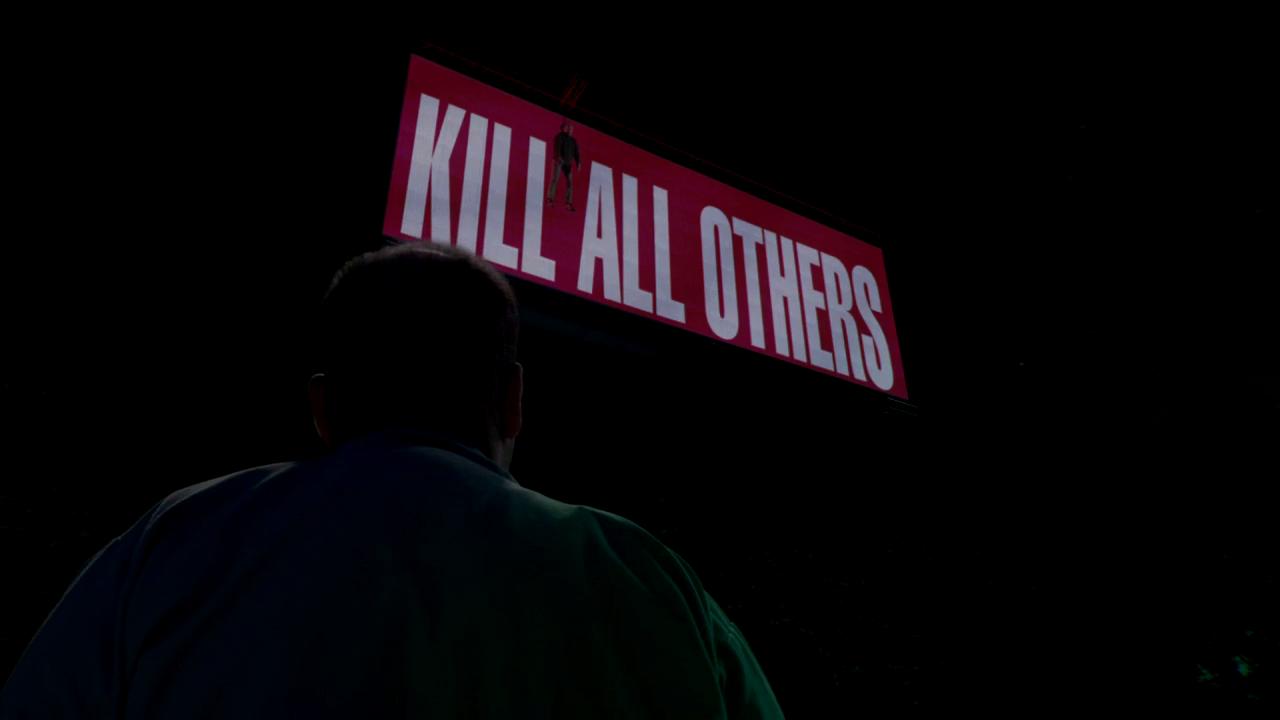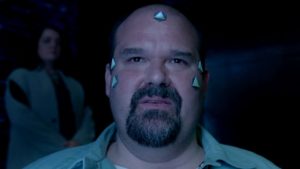
Philip K. Dick’s Electric Dreams – Kill All Others
 Starring: Mel Rodriguez, Glenn Morshower, Jason Mitchell, Sarah Baker, Vera Farmiga
Starring: Mel Rodriguez, Glenn Morshower, Jason Mitchell, Sarah Baker, Vera Farmiga
Director: Dee Rees
Writer: Dee Rees, (based on the writings of Philip K. Dick)
Review by: Sidney Morgan
This review absolutely CONTAINS MINOR SPOILERS. You’ve been advised.
Kill All Others is set in a future mega country known as MexUsCan. Yep, you got it. Mexico, the US, and Canada have merged to create one massive super country. It’s a story about a man, Philbert Noyce, played by Mel Rodriguez (The Last Man on Earth), who, while watching a political debate, or rather monologue, hears the candidate say “kill all others.” Shocked by this incitement to do violence, he waits for the logically expected reactions of shock and disgust from the moderator, the audience, the viewers and everyone else. But to his dismay, there aren’t any. What follows is Philbert’s attempts to come to grips with those three words and the lack of any kind of public reaction. He’s baffled. He’s confused. As the show progresses, so does his descent into paranoia and self-destruction.

Mel Rodriguez plays his role really well. He’s a kind and decent guy who just doesn’t understand this whole ‘hate’ thing. His disbelief, his increasingly erratic behaviour, it makes sense to the viewer. And trying to confront the mass nonchalant attitude displayed by practically everyone he encounters only serves to increasingly isolate him, to the point where he trusts no one, not even his wife. You can’t help but sympathize with him.
Closest to Philbert are his wife Maggie (Sarah Baker –The Campaign) and his two work colleagues, Lenny (Jason Mitchell – Straight Outta Compton) and Ed (Glenn Morshower – Bloodline, 24). They play an important role in trying to get Philbert to stop his paranoid behaviour and just accept what is. They’re his last line of defense. If they can’t do it, then there’s no hope left for Philbert. And if they fail? Accept what is. Just think, those same people who care about Philbert, who are concerned about his wellbeing, who’ve known him for years, are the same ones who remain quiet when the inevitable happens, ultimately endorsing the government and what it represents, including the hate. And, unlike some of the other stories tackling this theme, these people aren’t clones, they aren’t aliens who’ve replaced humans. No, these are normal people.

Though she has a small role, Vera Farmiga, who I loved as Norma in Bates Motel, perfectly plays the unfeeling political candidate who makes the ‘kill all others’ statement without blinking an eye. She doesn’t engage in theatrics, nor does she make a passionate plea for it. She is calm, unmoved and says it in passing, as though simply wiping a fly from her face.
Stories about the dangers of unchecked government power and subjugated citizens are not new (read Orwell). Is this what director Dee Rees (Mudbound, Pariah) is trying to do? Warn us? The original story by PKD, The Hanging Stranger, is about aliens (or lizard-like bugs) taking over, replacing humans (sounds familiar, right?). They hang a dead ‘stranger’ from a lamp post to draw out any remaining ‘real’ humans, as they’re the only ones who’d react to this atrocity. It was an allegory, partly highlighting society’s acceptance of violence, such as lynchings.
However, Rees takes a far more direct approach, not having a need for aliens or monsters. In her interpretation, it is humans who hang what appears to be a dead ‘stranger’ from a billboard, which draws out our non-conformist, Philbert. What are her reasons? Does she believe we are the monsters? Is apathy the monster? Does she bypass an allegorical approach because she believes us to be so perilously close to this reality she wants there to be no mistake in understanding her message?
The true horror in this world though is the use of the word ‘others.’ It even gives Philbert pause for concern as he tries to determine who these ‘others’ are. Gone are the traditional targeted reasons for discrimination. In this future, simple lack of conformity is reason enough to be handed a death sentence. And nothing ever goes wrong in this kind of police state, right?

Finally, though I have no answer, I wonder what Rees was trying to communicate by having only one political candidate present during the debates. Does she foresee a future where only one party systems exist? Is she trying to say that all parties will end up being the same, hence eliminating the need for a multi-party system? And why “The Candidate,” as though making it her name? Is Rees saying that political leaders are becoming clones, lacking any individuality? And the questions go on and on. Now, THAT is great storytelling, when you can elicit questions and discussion, without necessarily providing any hard answers.
Through Kill All Others, Rees reminds us that we can never let apathy imprison us. We all need to be like Philbert, to question what is wrong and to look out for one another. We simply need to make sure we all remain ‘others.’
Verdict: Watch it! A terrifying view of what could be, but hopefully won’t. Great production value, great acting and solid writing make this one of the better adaptations of the anthology.



